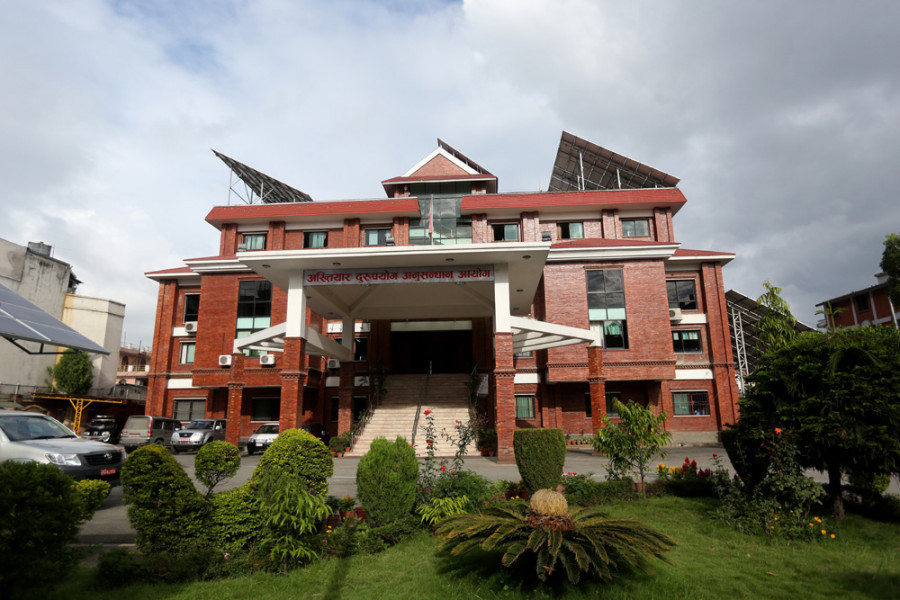National
Amendment bill to allow CIAA to investigate private sector lands in Upper House despite criticism
The opposition and analysts believe that the amendment is politically motivated and could be used to conduct witch-hunts against private individuals and institutions.
Binod Ghimire
The third amendment to the Commission for Investigation of Abuse of Authority Act, which will allow the constitutional watchdog to investigate the private sector, has been tabled at the National Assembly. Although the government says an amendment is necessary to align the provisions with the constitution, it has attracted widespread criticism for its potential abuse.
The government was planning to get the bill endorsed from the Upper House of Parliament on Tuesday, but it was removed from the agenda at the last hour after the primary opposition Nepali Congress sought more time for discussion. It is likely to be put back on the agenda for voting on Thursday, according to officials at the National Assembly.
But constitutional experts and commentators believe that the amendment is unnecessary and have cast doubts on the intention of the Prime Minister's Office, which drafted the bill. The amendment broadens the jurisdiction of the Commission for Investigation of the Abuse of Authority (CIAA) to allow it to investigate corruption in the private sector and any institution that the government designates as “public institution”.
According to the bill, banking agencies, medical colleges, public limited companies, institutions receiving funds from any of the three tiers of government, in addition to any institution designated a “public institution” in the Nepal Gazette, falls under the purview of the CIAA.
The government has said that the bill was introduced as per Article 239 of the constitution, which says that the responsibility, authority and the working procedure of the CIAA will be determined by the federal law.
Parshuram Meghi Gurung, chairperson of the Legislation Committee of Parliament and a ruling Nepal Communist Party (NCP) lawmaker, said the bill was introduced as a constitutional obligation.
“We held a series of discussions and reached a conclusion that institutions like banks, insurance companies and other entities that issue public shares should come under the CIAA’s scanner,” Gurung told the Post.
But legal experts say that the bill contradicts the constitutional mandate of the commission, which says it can only “investigate the abuse of authority,” and those who are not state officials do not fall under the definition of the abuse of authority.
“The bill is a departure from the spirit of the constitution,” Bipin Adhikari, former dean at the Kathmandu University School of Law who specialises in constitutional law, told the Post. “The commission cannot bring the private sector under its scanner unless they come connected with the people enjoying state authority.”
According to government officials, as Nepal is signatory to the United Nations Convention against Corruption, approved by Nepal’s parliament in 2011, it is bound to control corruption in the private sector. Adhikari, however, said that while it is true that the convention aims to prevent corruption in the private sector, it does not say that the authority needs to be provided to a constitutional body.
“Irregularities in the private sector and non-governmental agencies can be checked through ordinary legal processes,” he said.
The Nepal Rastra Bank, for instance, already has the authority to regulate the banking sector and there are numerous other laws, including the Money Laundering Prevention Act and the Insurance Act, to prevent banking fraud and black marketeering, said Adhikari.
Lawmakers from the opposition party say they had expressed serious reservations over the amendment during discussion at the parliamentary Legislation Management Committee, but as the ruling party holds a comfortable majority in the committee, the bill got through.
Prakash Pantha, a member of the committee from the Congress party, said that they are opposed to bringing the private and non-governmental sectors under the purview of the commission.
“The commission neither has the constitutional authority nor the capacity to investigate irregularities in the private and non government sectors,” he said.
Pantha said cross-party discussions have begun following the Nepali Congress’ opposition to the bill. Subas Nembang and Dinanath Sharma from the Nepal Communist Party and Radheshyam Adhikari from the Congress have been mandated to build consensus on the bill.
Commentators, however, are not convinced of the government’s reasoning behind the amendment and that it could easily become a tool to conduct witch-hunts against private individuals and institutions.
“The commission, despite being a constitutional body, has remained in the shadow of the executive, which has a say over the appointment of commissioners,” Hari Bahadur Thapa, former editor-in-chief of Annapurna Post who has reported extensively on corruption, told the Post.
“We know how Lokman Singh Karki, the former chief commissioner, targeted people and institutions he didn’t like.”
The integrity of the CIAA’s present leadership is also under question as it refrained from indicting Nabin Poudel and Supreme Court Justice Kumar Regmi, both of whom had illegally acquired plots of land at Lalita Niwas. Both Poudel and Regmi pledged to return the land and were not prosecuted. Poudel is the son of Nepal Communist Party General Secretary Bishnu Poudel.
The planned amendment is not just politically motivated but also administratively difficult, said Thapa, as the commission is already overwhelmed with cases and it has little organisational capability to look into the private and non-governmental sectors. Out of the 24,048 cases filed at the commission in the 2018-19 fiscal year, it was only able to look into 64 percent, or 15,611 cases. The anti-graft agency filed 351 cases at the Special Court that year.
The amendment will only cause panic in the private sector and demoralise them, according to Adhikari.
“If the bill is passed in its present form, it will affect the investment climate and might even lead to capital flight,” he said.




 8.67°C Kathmandu
8.67°C Kathmandu















